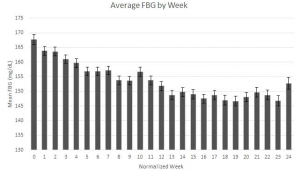New publication finds EpxDiabetes helped patients reduce A1c by 1.15% in just 4 months
August 31, 2017 at 8:23 AM
 A newly published study in JMIR-Diabetes, found that our automated messaging intervention, EpxDiabetes helped lower HbA1c by 1.15% in just four months, while keeping patients engaged for the long-term, specifically over 70% patient engagement through six months.
A newly published study in JMIR-Diabetes, found that our automated messaging intervention, EpxDiabetes helped lower HbA1c by 1.15% in just four months, while keeping patients engaged for the long-term, specifically over 70% patient engagement through six months.
The current standard of care for type II diabetes recommends tracking blood sugar numbers in a paper journal, yet this method is not ideal for patients or providers. Patients do not complete paper journals leading to incomplete information and it is often months before providers can review and titrate medication.
Researchers write that the intervention, EpxDiabetes was designed to specifically address these challenges by closing the patient-provider feedback loop and reaching patients by their preferred manner of communication.
The study enrolled 396 patients with poorly controlled type II diabetes from a community clinic in St. Louis, Missouri. Patients received automated text or phone-based messages asking them to report their blood sugar numbers. Patient-reported values indicating poor health then triggered a provider alert, enabling timely outreach to the patient.
"With the proliferation of text messaging across all ages and demographics, Epharmix is reaching many patients by their preferred manner of communication. The staying power of this intervention likely stems from the efficient and streamlined algorithms designed to optimize the frequency of contact with the patient. Glucose control in diabetes often is a matter of patient engagement and adherence with their dietary and medication regimen. Epharmix is able to keep patients engaged with their disease management knowing their data is constantly being monitored by their providers.” said Dr. Huynh, researcher, and physician at Mercy Clinic in St. Louis, Missouri."
The EpxDiabetes system was able to identify and alert providers in real time to 395 total acute hypoglycemic (FBG<70) or hyperglycemic (FBG>400) events. These alert notifications resulted in 228 patient-initiated calls and 83 provider-initiated calls and interventions. In addition to seeing a statistically significant reduction in A1c of 1.15%, the average monthly fasting blood glucose (FBG) values decreased significantly among patients engaged with the system over the course of the six month study.
The researchers concluded that EpxDiabetes is an inexpensive, low-risk, noninvasive intervention that helps patients with uncontrolled type II diabetes get to control faster.
For a self-guided demo of EpxDiabetes, go to try.epharmix.com/diabetes.
For more information about this study or Epharmix, reach out to jason (at) epharmix.com



